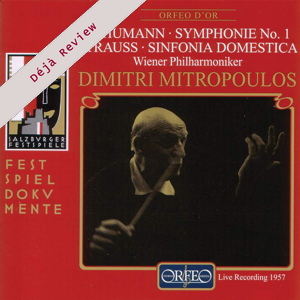
Déjà Review: this review was first published in November 2001 and the recording is still available.
Robert Schumann (1810-1856)
Symphony No. 1 in B flat, Op. 38, ‘Spring’.
Richard Strauss (1864-1949)
Sinfonia domestica, Op. 53.
Vienna Philharmonic Orchestra/Dimitri Mitropoulos
rec. live, 28 August 1957, Festspielhaus, Salzburg
Mono ADD
Orfeo C565011B [75]
This remarkable concert concluded the Salzburg Festival of 1957: the missing link between these two works was Ravel’s Piano Concerto for the Left Hand (with Robert Casadesus, no less, as soloist). Daringly, it began with an underdog: Schumann’s first symphony still remains underestimated as accusations of ineptitude of scoring follow it doggedly wherever it goes. What it needs, and what it receives here, is unquestioning devotion to its cause. The rapport between the VPO and Mitropoulos is obvious at every turn. The lightness of rhythm in the Allegro molto vivace of the first movement is infectious; the opening fanfares appropriately arresting; lastly but perhaps most importantly, Mitropoulos always gives the strings time to breathe. Given that these are the strings of the VPO, this is almost guaranteed magic, but Mitropoulos’s labyrinthine knowledge of the score means that there is an inevitability about the performance of both this movement and of the piece as a whole.
Of course the Vienna Philharmonic are in their element in the Ländler passages of the third movement. Mitroupoulos chooses his tempo for the finale carefully, which can so often feel breathless rather than animated (at the expense of the composer’s ‘grazioso’ marking). This is a most spirited reading which loses little to its main rivals of Klemperer, Kubelik or Muti, and most definitely gains by being live.
Strauss’ Sinfonia domestica of 1904 remains infrequently performed. Perhaps it takes Straussian pictorialism too far for some (in this case familial pictorialism to boot), perhaps it lacks the swaggering over-confidence of Heldenleben, but more likely its absence from concert platforms rests in its sheer complexity and the demands it makes on its players. Go on, just ask any horn player you know ….
If one orchestra is going to rise to these challenges, it will be this one, and so it proves. Mitropoulos guides his players through the domestic adventures with a sure sense of rhythm and natural feeling of flow. The orchestra responds, as might be expected, warmly and securely to this treatment. The date of the recording and its radio broadcast origin mean that textural detail is an inevitable casualty at times, but this is a small price to pay for the sheer swagger and sense of adventure of the experience. Kempe’s EMI Dresden performance might seem the obvious comparison, but a closer and perhaps more revealing bedfellow might be Clemens Krauss’s performance with the same orchestra (from the early fifties and available on the stunning Testament label, coupled with Bourgeois gentilhomme on SBT1184). Whatever the case, Mitropoulos’s Orfeo disc remains a must-hear, never less than fascinating experience.
Colin Clarke
Help us financially by purchasing from



















